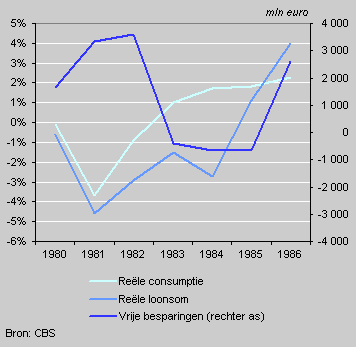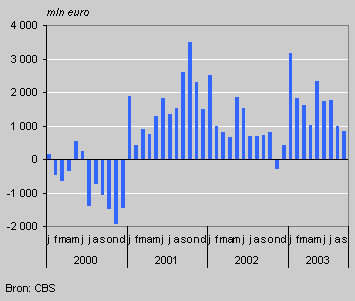Consumption stabilised by savings

The Netherlands is facing a period of wage restraint. Last week the members of the FNV labour union accepted an agreement reached in October by the social partnership of government, management and unions. The agreement specifies that collective wages will not go up in 2004 and 2005.
However, as history teaches us, this need not have a negative effect on consumption. During the last period of wage restraint, in 1983 and 1984, the loss of purchasing power was compensated by lowering household savings.
Wassenaar Agreement
The Dutch economy slumped during the seventies and early eighties. In 1981 and 1982 employment decreased and the inflation rate was high: 6.8 percent in 1981 and 6.0 percent in 1982. That lowered the real wage sum. Consumption, corrected for price changes also slumped.
In November 1982 the central employer and employee organisations reached an agreement on wage restraint, laid down in the "Wassenaar Agreement". The increase in gross wage costs per employee was brought almost to a standstill in two years time: from the 6.0 percent level of 1982 to a mere 0.5 percent in 1984.
Wage sum, consumption and savings, 1980-1986

Consumption level maintained by withdrawing savings
In 1983 and 1984 the real wage sum fell. The inflation rate in those years hovered around the 3 percent mark, and employment fell by 1.8 percent in 1983.
However, loss in purchasing power did not lead to a decrease in real consumption. The latter even increased in volume: by 1.0 percent in 1983 and 1.7 percent in 1984. In the years following the Wassenaar Agreement, households kept their expenditure up by using their savings, whereas in 1981 and 1982 households had increased their savings balances.
Differences in savings in savings accounts

Savings showing increasing differences
Savings could again make the same contribution to consumption as they did in the eighties. Since January 2001 the month on month differences in savings in savings accounts have increased almost continuously. During the first six months of 2003 people saved 3.3 billion euro more than they did in the same period of 2002. This is the equivalent of about 3 percent of the value of consumption during the first six months.
Roeland Engelen and Gert Buiten
Source: StatLine (Dutch only)